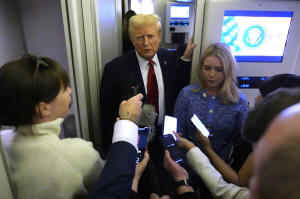'Remarkably poor judgment': Wall Street Journal takes a critical eye to
start of Trump's 2nd term
 Send a link to a friend
Send a link to a friend
 [January 30, 2025]
By DAVID BAUDER [January 30, 2025]
By DAVID BAUDER
Amid all of the enthusiasm in conservative media for President Donald
Trump's first week back in office, the Rupert Murdoch-owned Wall Street
Journal has notably applied some brakes.
The Journal has editorialized against Trump's pardons of Jan. 6 rioters,
called presidential appointee Robert F. Kennedy Jr. “dangerous to public
health,” suggested Trump give up the effort to end birthright
citizenship and twice said he was wrong to strip protection of former
officials under threat from Iran.
The newspaper also said that Trump showed “remarkably poor judgment” in
selling $Trump brand crypto coins and described as “illegal amnesty” the
president's order delaying implementation of a law that would have
forced TikTok's shutdown in the U.S.
It stands in contrast to the excitement shown about Trump at some
outlets popular with conservatives, including the Murdoch-owned Fox News
Channel, which had a segment on Monday about whether Trump's likeness
should be carved into Mount Rushmore.
“Trump in four days has cemented his status as the G.O.A.T. — the
greatest Republican president of all time, better than (Ronald) Reagan
or Abraham Lincoln,” Wayne Allyn Root wrote in World Net Daily. “And I'm
writing this on his fifth day!”

There's still some muscle left in newspaper editorials
The Journal is also showing that there is muscle left in the idea of
newspaper editorials, after decisions by owners of The Washington Post
and Los Angeles Times last fall not to endorse a candidate in the
presidential race between Trump and Kamala Harris.
The Journal is a respected legacy news organization. Its news pages are
not driven by a political point of view, but its editorial pages have
long been a leader in conservative thought. Its editorial writers have
praised some of Trump's early moves, including dismantling diversity,
equity and inclusion efforts and attempts to open Alaska to more
development.
On Inauguration Day, the Journal wrote that Trump “delivered a message
of aspiration and optimism that most Americans will welcome. If this
captures his real plans, he has a chance to leave office in four years
as a success.”
But in the details, the Journal has found some of Trump's action
wanting. The pardon of Jan. 6 rioters “is a rotten message from a
president about political violence done on his behalf, and it's a
bait-and-switch,” the newspaper said, pointing to earlier Trump comments
that he would be looking at individual cases.
Trump's decision to strip government-paid security from his former aides
Mike Pompeo, John Bolton and Brian Hook — all threatened by Iran —
“looks like a new low,” the Journal said. “Decisions about security
details are supposed to be based on neutral assessments of the danger,
not some vindictive whim,” an editorial published on Jan. 24 said.
The newspaper also had sharp words for Trump's decision to enter the
crypto market. “In his first term, Mr. Trump was often deterred from
some of his worst impulses by legal advisers who saw their job as
serving the presidency as much as the president,” the newspaper said.
“The crypto caper is a worrisome sign that Mr. Trump's current advisers
don't understand the difference any better than he does, or that they
are too cowed to speak up.”
Paul Gigot, editor of the Journal's editorial page, said that “we are
covering Trump like we do every president, and that means supporting his
decisions when they warrant it, and criticizing them when that is
deserved. It's no more complicated than that.”
[to top of second column]
|

President Donald Trump speaks to reporters aboard Air Force One en
route from Miami to Joint Base Andrews, Md., Monday, Jan. 27, 2025,
as White House press secretary Karoline Leavitt listens. (AP
Photo/Mark Schiefelbein)

The Journal's editorials show they are fulfilling a role as
thoughtful opinion journalists and not simply advocates, said Tom
Rosenstiel, a University of Maryland professor and co-author of “The
Elements of Journalism” with Bill Kovach.
In that book, “we make the point — how do you define what is the
difference between pure advocacy and opinion journalism? The
difference is intellectual independence, that you speak your own
minds, you're not just a cheerleader,” Rosenstiel said.
Is it the ‘second coming of JFK,’ as some in conservative media
gush?
In general, the conservative media “has been treating this like the
second coming of JFK,” said Howard Polskin, author of “The Righting”
newsletter that tracks trends in that space. For every piece that
offers some criticism, “there are 15 that are gushing with praise,”
he said.
“We've talked and dreamed of this scenario for years, but now it's
happening right in front of our eyes,” Kurt Schlichter wrote in
TownHall. “It's beautiful, man. It's like the jungle exploding in a
fireball in ‘Apocalypse Now.’ We love the smell of napalm in the
morning. It smells like victory.”
On Foxnews.com, conservative columnist Hugh Hewitt said Trump had a
near-perfect first week, with the only exception being the decision
on security for the former presidential aides. “Trump did the
governing equivalent of batting 1.000 or hitting 10 for 10 from
behind the arc in the NBA,” Hewitt wrote.
In two noted liberal editorial pages, The New York Times has opposed
the Jan. 6 pardons but otherwise not commented editorially on
Trump's early moves. Before the inauguration, the Times wrote that
people should not be intimidated by Trump. The Washington Post has
called Kennedy unqualified, suggested Trump revisit plans to fire
inspector generals and said the decision to withdraw from the World
Health Organization was a mistake. It criticized pardons by Trump —
and by predecessor Joe Biden.
Tuesday was also a day of celebration for many in the conservative
media who felt welcome in the White House for press secretary
Karoline Leavitt's first briefing. She made a point of saying she
would open up the briefing room to podcasters and media influencers,
along with reviewing the status of hundreds of people denied access
during the Biden administration.

On social media, Monica Paige of Turning Point USA praised the
“fabulous and professional briefing” by Leavitt and said, “thank you
for finally giving a voice to those who have been silenced over the
last four years.”
Natalie Winters of Steve Bannon's “War Room” also delivered a report
from the White House and said her eyes were not just going to be on
the Trump administration. She said the media was going to be “the
hotbed of resistance.”
“I'm going to be covering what President Trump is doing but, more
importantly, what the mainstream media is doing in terms of lying
and deceit in the narratives they're going to be crafting to neuter
and nullify President Trump's America first agenda,” Winters said.
___
David Bauder writes about the intersection of media and
entertainment for the AP.
All contents © copyright 2025 Associated Press. All rights reserved |